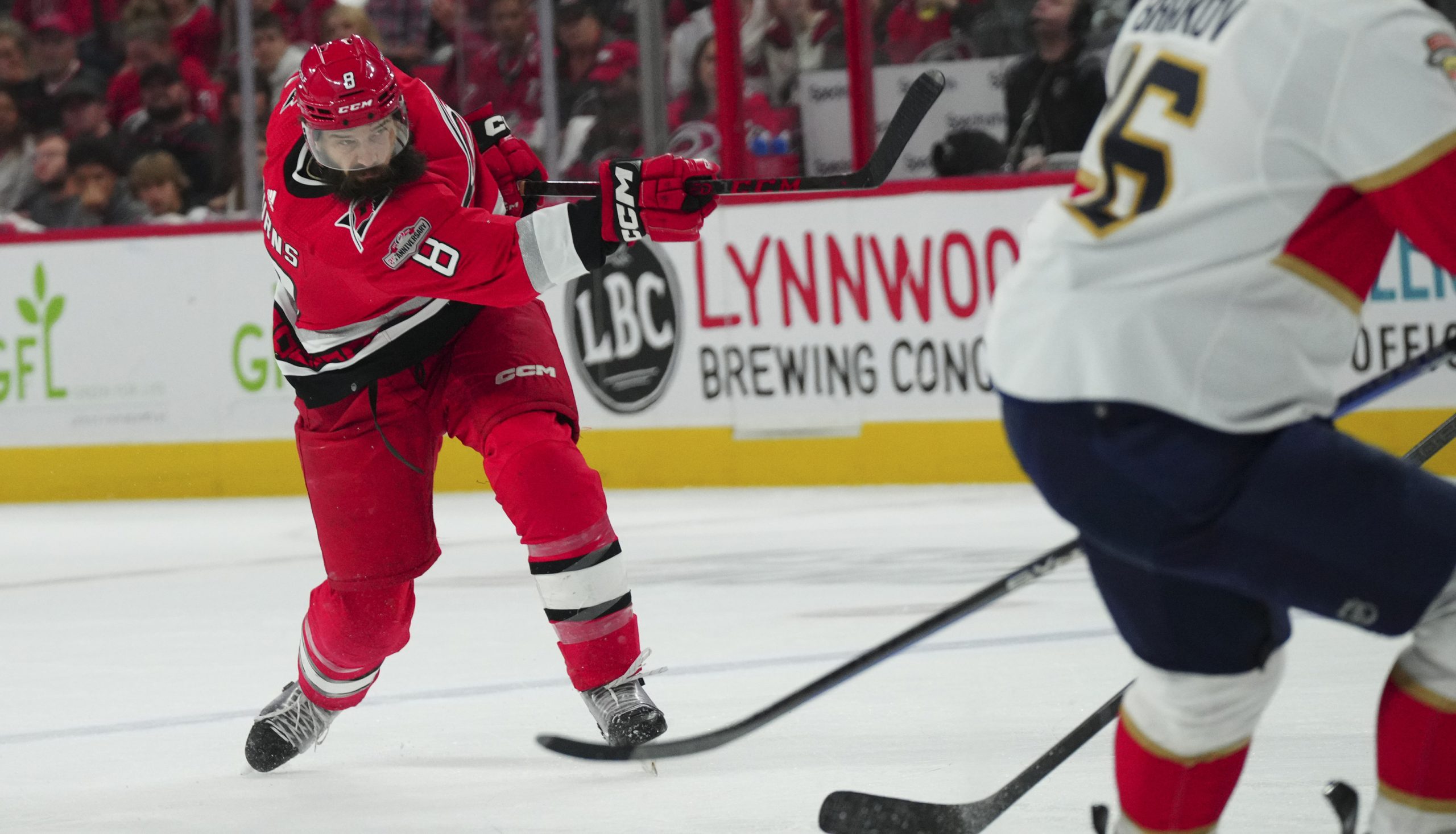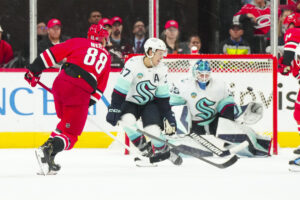“Defence wins championships.” This is a mantra that has rung through many sports. At its core, this thought process makes sense. If the other team can’t score, they can’t win. But what about scoring from the backend? The Carolina Hurricanes in the last half a decade have strongly leaned into this way of thinking. With arguably one of the best defensive groups in the NHL, and a heavy reliance on a defensive team structure, they have shown much regular-season success. Notably, they tend to lean on their defence for offence. But if you can’t score, you also can’t win. And they have not reached the ultimate goal….yet. So where is the line in the sand drawn?
The Carolina Hurricanes Focus on Defence
Following a period of lacklustre defensive depth, the Hurricanes started taking on a new identity in the last few years. Largely spearheaded by the progression of Brett Pesce and Jaccob Slavin, mixed with hiring Rod Brind’Amour as coach, the Hurricanes defensive strength consistently grew into a force in the Don Waddell era. When the Hurricanes couldn’t reach a deal with offensive defenceman Justin Faulk, they moved him to the St. Louis Blues. However, management moved to replace his offence by acquiring Dougie Hamilton. Hamilton provided a scoring punch on the back end playing alongside defensive expert Slavin. Then they replaced Hamilton by making a somewhat controversial move in signing Anthony DeAngelo. DeAngelo thrived in Carolina, putting up 51 points in the 2021-22 season. Again, without reaching a contract agreement, the Hurricanes moved him to the Philadelphia Flyers.
In true form, they quickly moved to acquire veteran offensive defenceman Brent Burns. Burns, also playing alongside Slavin, broke the record of most points by a Hurricanes defenceman last season. With that strong top pairing, the second pairing of the drafted Pesce with Brady Skjei, acquired from the New York Rangers, compiled one of the strongest second pairs in the NHL. Then the emergence of Jalen Chatfield on the third pairing with Calvin de Haan and later Shayne Gostisbehere formed another strong pair. Together, alongside a strategy that focuses on a heavy forecheck to create turnovers and moving the puck to the point for shots, this defensive group scored the most goals by defencemen for any team in the NHL.
Adding Strength to Strength
So, alongside the long-standing idea that Carolina needs to figure out how to score more goals compared to the large number of chances and expected scoring metrics they produce, what has Carolina done this offseason? Added strength to strength. Unlike previous seasons, they did not need to replace their top scoring defenceman. However, following the Flyers buying him out, the Hurricanes signed DeAngelo to another one-year contract. In a bigger move, they signed top-free agent Dmitry Orlov to a two-year contract. Both defencemen add scoring punch from the backend while Orlov is another solid top-four defenceman. Additionally, they added Caleb Jones and re-signed RFA Dylan Coghlan as depth defencemen. And they did this without really losing any main pieces of the defence (barring a trade later in the offseason).
Defence Does Win Championships…..
The question with this gameplan is simple. Does a focus on defence truly lead to a championship for the Hurricanes? It’s no secret that Waddell recognizes this as their strength and wants to continue to lean into it. They have had great regular season success and some playoff victories but have not reached the Stanley Cup final since 2006.
We’re two months out from #Canes Opening Night, and there’s a lot to look forward to.
— Carolina Hurricanes (@Canes) August 11, 2023
Facts and Trends
Looking back at the last five Stanley Cup Champions, it’s interesting to examine their defensive scoring. In the goal scoring department, the only Stanley Cup Champion who’s defence also led the league in goals were the Colorado Avalanche in 2022. Their 62 goals from defence made up a little over 20% of their total goals that year. The 2019 Stanley Cup Champion St. Louis Blues finished second in the league with 46. This made up almost 19% of their total goals. The Tampa Bay Lightning sat at eight and 13th in their back-to-back Stanley Cup Championship seasons respectively. Their defensive scoring accounted for a little over 16% and almost 14% of total goals respectively.
Last season, the Vegas Golden Knights did not end as strong in this category as they barely cracked the top twenty with 36 goals. BUT, last season’s Golden Knights defence was arguably one of the deepest in the NHL. Out of the Knights 267 goals last season, their 36 from defence only accounted for a little over 13%. In comparison, the Hurricanes defence last season accounted for almost 23% of their total goals.
In the playoffs last year, the Golden Knights led in goal differential by far with a positive 31. The runner up Florida Panthers were the leader in goals by defencemen with 12. The Golden Knights were tied for third with the Hurricanes. Of course, playoff numbers are likely skewed in favour of the teams that make it furthest, but it still showed that defensive scoring was important. Even with that, the goal scoring heavily leaned on the forwards as Vegas scored 88 total goals, Florida 62, and Carolina 46.
The Results Show Hockey’s Unpredictability
While these trends don’t seem to point to a one size fits all answer, it does show some interesting conclusions. One is that none of the last five Stanley Cup Champions have relied on scoring from the backend for over a quarter of their goal scoring. In fact, many relied on much less. What it did show, however, was that defensive scoring tended to be correlated with success. Of course, that might also be tied to successful teams’ overall scoring as well.
The reality is that hockey is such a dynamic sport with so many factors that there will not be an overly conclusive trend here. Is defensive scoring important? It appears so yes. Does a team need to lean on it to win? Not at all. The bigger component that is crucial to success is that the team’s gameplan and players fit.
With the Hurricanes Defence, it Will Take a Village
What I mean is that if the Hurricanes are going to rely on shot generation from the point and defensive scoring, they also need forwards that are able to win pucks in deep, make smart passes to the point, and get to the net for tips and rebounds. Likewise, they have to be defensively responsible if the defencemen are going to rush the puck and jump into the play.
This is where bringing in players like Michael Bunting could really help the team. His tenacity around the net should provide that supporting piece to the Hurricanes defence leaning offence. Meanwhile, you put in a freer willing defenceman in Dmitry Orlov complimented with responsible defensive forwards like Jordan Staal, and opposing teams could get confused fast. BUT, it takes everyone executing the game plan for it to work. Meanwhile, if capable, the team can utilize their higher skilled forwards and crafty defencemen to sometimes go off plan to confuse other teams. This creativity will be just as important for success.
The conclusion is that the Hurricanes generating offence from the defence could work. It has shown success in the regular season. But in the playoffs, when the game is tighter and you have to be more opportunistic, the forward group will have to get to the dirty areas and get garbage goals. You can’t just sit back and say the defence will get it done, it takes everyone. And it takes grit and creativity. The Hurricanes are close, they just need that one more step.
Main Photo Credit: James Guillory-USA TODAY Sports






